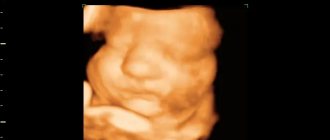Pregnant: Pixabay Week 37 of pregnancy marks the beginning of the last month and brings the expectant mother closer to giving birth. According to obstetric calculations, the baby is in the womb for approximately 40 weeks, rather than the generally accepted 9 months. Therefore, at this time the baby may well be born. Read more about this, as well as all important aspects, in the article.
How many months is this?
As a rule, most pregnant women believe that they will carry a child for 9 months. However, this is not an entirely correct belief. Doctors count a little differently. If we consider a standard pregnancy, without any deviations, then it will last 280 days.
There is such a thing as an obstetric month. So it is equal to 28 days, that is, it has exactly 4 weeks of 7 days. Therefore, the 37th week is the first week in the ninth obstetric month and the onset of labor at this time is quite normal.
Movement, weight and size of the fetus
At this time, global processes occur in the child’s body:
- The adrenal glands increase in size. They become larger than the kidneys. This is necessary for the production of the hormone. It will reduce the effects of stress that the baby will experience during birth.
- The liver accumulates iron, which is necessary for the normal supply of blood cells to the baby in the first year of life.
- The mucous membranes lining the child's stomach and intestines are completely covered with villous epithelium, thanks to which the child will be able to accept and digest food. The intestines begin to contract more actively.
- The child’s neurons are covered with a protective sheath, which is necessary for normal coordination of movements in the future. This is not a quick process, which will last until birth and throughout the entire first year of the baby’s life.
- The cartilage in the nose and ears becomes harder. At the same time, the bones of the child’s skull remain soft. This is necessary for easier passage of the baby through the birth canal. Two fontanelles are not covered by bone tissue at all.
- At this time, the baby’s facial features have already clearly formed; they are clearly distinguishable. Individual patterns on fingers (fingerprints) also appeared.
- The skin becomes lighter, lanugo disappears. But the eyes and hair have not yet acquired a permanent color.
- The child's lungs are developing rapidly. This process is facilitated by the hormone cortisone, which is produced in increased quantities by the mother’s body. While the lungs are “turned off,” blood will begin to flow to them immediately after the baby is born. There is enough surfactant so that the child can breathe normally.
- The immune and endocrine systems and sensory organs continue to form.
The baby's weight at 37 weeks is 2.8-2.9 kg and it continues to increase every day. The growth of the fetus at this time can reach up to 49 cm, and the circumference of the head and abdomen are equal. Every day there is less and less space left in the uterus, so the woman clearly feels even the slightest movements of the child. This is not surprising, because every week the child gains 1 cm in height alone.
At 37 weeks of intrauterine life, the baby should take its permanent position. In 95% of cases, the baby lies head down, although other options are not excluded.
Sometimes the baby’s movements can give a woman uncomfortable and even painful sensations, because he has grown noticeably and can push with greater force. The expectant mother needs to listen to the baby's movements. He should move at least 10 times every 12 hours, that is, almost every hour. If the child moves much more often or, on the contrary, there are no movements for several hours, then you should definitely consult a doctor.
What's happening
At 36–37 weeks of pregnancy, the baby’s body produces hormones important for life. One of them, cortisone, is necessary for the full maturation of the lungs. Iron actively accumulates in the liver. Without this microelement, the proper functioning of the body is impossible. In the last trimester of pregnancy, the fetal liver contains five times more iron than adults. This supply will be enough for the baby for the first six months of life.
At the 37th week of pregnancy, the main systems of the body continue to improve. Neurons in the brain begin to be covered with a myelin sheath, which helps nerves transmit signals. This process will continue throughout the first year of the child's life.
The ear and nasal cartilages harden, but the bones of the skull, due to the fontanelles, will remain flexible, so that it is easier for the baby to overcome the obstacles of the birth canal. The fontanel is an area where there is no bone tissue. A newborn baby has as many as six of them, but most close immediately after birth. As the cranial bones grow, the fontanelles will gradually disappear.
Precursors of labor at 37 weeks of pregnancy
At 37 weeks of pregnancy, labor may begin. First of all, this applies to women who are giving birth not for the first time. Be that as it may, you need to be prepared for the fact that labor can begin at any time.
It is important that relatives know how to behave if a woman goes into labor. You should also take care in advance about the bags that you will need to take with you to the maternity hospital. You should not go far from home, and you should always keep your exchange card and mobile phone at hand.
The following signs may indicate impending birth:
- Abdominal prolapse.
The belly may drop lower, reducing pressure on the chest and making it easier to breathe. However, not every woman has a drooping belly, and this sign may never appear.
The lower the fetus is located, the stronger the painful shootings in the perineum and lower limbs will be. The skin on the abdomen becomes more stretched, which may result in mild itching. To get rid of this problem, you should use a moisturizer.
Some women experience slight inversion of the navel. As a result, a dark line may appear in the center of the abdomen. There is nothing wrong with this, since after childbirth this line will disappear.
Naturally, the pressure on the intestines and bladder increases, which means trips to the toilet become more frequent. The closer the moment of birth, the quieter the child begins to behave.
- Exit of the mucus plug.
The passage of the mucus plug that covers the cervix is another harbinger of labor. It can come out either a few days before the onset of labor or several weeks before it. Again, removing the plug is not a necessary process. The mucus plug is represented by thick, viscous secretions. As a rule, not the whole cork comes out, but part of it. The discharge may be clear, pink, brown, or even streaked with blood.
- Energy boost.
Before labor begins, women often feel a surge of strength and energy. Their mood improves, they have the desire and strength to do various things, as if a “second wind” opens.
- Discharge of water.
The water may break during contractions and before they begin. Be that as it may, if a woman sees liquid discharge flowing down her legs, she must either go to the maternity hospital herself or call an ambulance. Moreover, you should not wait for contractions, since the breaking of water always indicates the onset of labor.
- Loss of body weight, loss of appetite.
During pregnancy, a woman's appetite increases, but a few days before giving birth, it may, on the contrary, decrease. Sometimes, 3-4 days before the birth of a child, women completely refuse to eat, as the desire to eat completely disappears. At the same time, it is possible to reduce body weight by 1-2 kg.
- Diarrhea.
Sometimes the day before giving birth, the stool may become loose. Therefore, when diarrhea occurs against the background of complete health, it is quite natural that a woman will end up in the maternity hospital after a couple of days.
- Drops of colostrum on clothes.
Many women begin to notice small stains on their bra or jacket. If you bring them closer to your face, you can smell the milky smell. These are the first drops of colostrum, which also indicate the imminent birth of a child.
- Abdominal pain, pulling lumbar pain, contractions.
The fact that labor will begin soon will be indicated by nagging pain localized in the lower abdomen. They also involve the lower back and can resemble the painful sensations that a woman experiences before her next period.
However, the most obvious sign of imminent labor is contractions. We are not talking about training contractions of the uterus, not about Braxton-Higgs contractions, which occur without pain, but about real contractions. Therefore, if a woman experiences such sensations, she must go to the maternity hospital.
Braxton Hicks contractions are called false contractions because they do not signal the onset of labor. They can be removed by taking a cold shower or simply changing your body position. Real contractions are characterized by severe pain, and the rest interval between them is constantly decreasing.
Pregnancy 37 weeks: changes in a woman’s body
What pleasant moments are worth celebrating at 37 weeks? For many months I have been bothered by heartburn and shortness of breath, and now these sensations will go away. This is due to the gradual lowering of the tummy and the weakening of its pressure on the stomach and diaphragm. Some unpleasant sensations, according to the webmd.com resource, cannot be avoided, for example:
- sweating increases, often the pregnant woman feels stuffy and feels hot due to the increased blood volume;
- it is more difficult to move and fall asleep at night due to an enlarged tummy;
- drowsiness and weakness appear due to increased stress on the body.
The next two points also require attention when you reach 36–37 weeks of pregnancy: discharge and pain.
Photo: Sevastyanova I. et al. Atlas of human anatomy. - Kharkov, Belgorod: Family Leisure Club, 2008. - 80 p.: UGC
The volume of discharge normally increases, but it should still remain colorless and odorless. The main thing is that there is no mucus or blood in them. Any changes may indicate impending birth. And I always warn expectant mothers about this.
As for pain, it occurs in the lower back, pelvis, abdomen, and limbs. They are associated both with the load and with preparation for future childbirth. So, during this period the pelvic bones begin to move apart, which sometimes causes discomfort.
Don't rush to take your pills. Self-medication can harm your health. Therefore, be sure to visit your doctor to get qualified recommendations.
Tightening or pain in the stomach at 37 weeks of pregnancy
The belly may drop at 37 weeks of pregnancy, a week earlier or a week later. If this does not happen, then do not worry. Sometimes the stomach does not drop until childbirth and this is a variant of the norm.
If your belly is drooping, this does not mean that labor should begin in the next few hours. It is quite possible that the woman will carry the child for another 1-2 weeks. However, it will become much easier for her to breathe.
Along with easier breathing comes other difficulties. Thus, pain in the lower abdomen may intensify. If the pain moves to the lower back and is cramping in nature, this may indicate the onset of labor.
Pain at 37 weeks of pregnancy
The nagging pain that occurs at 37 weeks of pregnancy may be due to the fact that the woman’s stomach has dropped and labor will soon begin.
There may also be pain in the sacrum, lower extremities, spine, and back. They are explained by the fact that the woman’s body weight has increased significantly, and the uterus has become much larger in size. To reduce discomfort in your legs and back, you need to rest as much as possible; it is good to place a bolster or pillow under your feet at this time. A prenatal bandage helps relieve stress from the spine.
Pain may also appear in the pubic area, in the pelvis. They occur due to divergence of the pelvic bones. After all, a woman’s ovaries and placenta produce more of the hormone relaxin, and the baby itself puts pressure on the fundus of the uterus. The fewer days left until the baby is born, the more intense the pain in the lower abdomen can be.
Discharge at 37 weeks of pregnancy
Don't panic if you see traces of discharge on your underwear - this is normal. They may also contain mucus, which makes the discharge stretchy. This way the mucus plug comes off. The discharge often turns brown, whitish or pink. Sometimes the plug comes out completely. In this case, it looks like a lump consisting of milk jelly or a silicone formation. It is difficult to confuse a mucus plug with something else. In terms of volume, it can fit in two tablespoons; often such a lump contains bloody threads. If a woman’s mucus plug has completely come out, then there is no doubt that labor will begin very soon.
Greenish, yellowish or dark brown discharge, mucus with foam or lumps resembling cottage cheese are not normal. If such discharge appears, you should go to see a doctor as soon as possible. It is possible that some kind of infection has occurred, which must be gotten rid of before the baby is born. After all, he can become infected with almost any disease while he passes through the birth canal.
If a woman detects bloody discharge, then it is necessary to call an ambulance as quickly as possible. Blood very often indicates placental abruption. This is a very dangerous condition that threatens the life of the child.
When water breaks out, you should also not hesitate to call a medical team. It is impossible not to notice them, as streams will flow down your legs. They indicate the onset of labor. Sometimes amniotic fluid does not come out all at once, but in portions. This indicates a violation of the integrity of the fetal membrane. If such a situation arises, it is also necessary to consult a doctor.
Doing an ultrasound
A woman at 37 weeks should visit a gynecologist every 7 days. At this time, the doctor monitors the body’s preparation for childbirth, may examine the cervix, and always listens to the baby’s heartbeat.
As a rule, the woman has already undergone a planned ultrasound, which is the third one. However, sometimes another ultrasound examination is required, for example, when there is a need to clarify the position of the baby in the uterus. Sometimes he does not fall head down, but turns his back or side. In this case, the question of performing a caesarean section may arise.
During an ultrasound, the doctor assesses the size of the fetus, the condition and amount of amniotic fluid and compares them with the norm. At the same time, it is necessary to clarify the maturity of the placenta, the condition of the umbilical cord, uterus and cervix.
At this time, a woman can study as much information as possible on breastfeeding; it is impossible to find any artificial nutrition that could replace mother’s milk. It contains antibodies and other unique components that are essential for a growing body. It is also worth mastering the subtleties of caring for a baby, because he will be born very soon.
Pregnant woman
The body of a pregnant woman continues to actively prepare for the birth of a baby, the content of estrogen rapidly increases, and the level of progesterone decreases significantly. Changes in hormonal levels help soften the tissues of the birth canal and cervix. Throughout pregnancy, the lumen of the cervical canal is closed by a plug of thick mucus, which protects the baby from infection, and the uterine cavity protects against the penetration of microorganisms hazardous to health. In the last weeks of pregnancy, the consistency of the mucus changes, it becomes more liquid and begins to gradually flow out. In some women, the mucus disappears gradually, while in other women in labor it comes off simultaneously. The discharge resembles colorless egg white in its consistency and appearance. Sometimes the mucus is pinkish, brown or yellow. The removal of the plug is painless; the woman may experience a slight feeling of discomfort in the lower abdomen. The removal of the plug may be signaled by more abundant vaginal discharge than during the entire pregnancy.
A woman should carefully monitor the color and volume of discharge, since too much colorless discharge may indicate not only the passage of the plug, but also be one of the symptoms of leakage of amniotic fluid. Indicator pads and amniotests or test strips will help determine the cause of the discharge. The pads are sold in many pharmacies and can be easily used at home. If leakage of amniotic fluid is confirmed, you should immediately consult a doctor.
After the mucus plug comes off, you should avoid visiting the pool and swimming in open water, as the risk of infection for the child increases significantly. It is also necessary to exclude sexual contact.
We take tests, undergo examinations
If there are no abnormalities during pregnancy, then the woman will need to submit urine for a general analysis. The doctor will also measure her blood pressure, measure the height of the fundus of the uterus and the volume of the abdomen.
The height of the uterine fundus is 37 cm. If this figure is exceeded, the doctor may suspect polyhydramnios. This often becomes a reason for sending a woman to a maternity hospital. This will allow doctors to constantly monitor the situation. If the height of the uterine fundus has decreased, it means that the baby will soon be born, as this indicates its prolapse.
As for protein in the urine, normally it should be absent there. If protein appears in the urine shortly before childbirth, this is an alarming signal. It is possible that a woman is developing preeclampsia. This is one of the severe forms of toxicosis that develops in late pregnancy. Other signs of preeclampsia are: surges in blood pressure, swelling, and weight gain. At this time, the child will suffer from lack of nutrition and oxygen starvation. At the same time, the load on all organ systems of a woman increases.
Tests and studies during pregnancy
Ultrasound (ultrasound examination) - 35-36 weeks after the first day of the last menstruation.
The condition of the placenta, the height and weight of the child, its position in the uterus, and the quantity and quality of amniotic fluid are assessed. Blood test for AIDS (HIV), syphilis (RW) - 35-36 weeks after the first day of the last menstruation. These diseases can complicate pregnancy and childbirth.
Biochemical blood test - 35-36 weeks after the first day of the last menstruation. Gives an idea of the general health of the pregnant woman.
Vaginal smear - 35-36 weeks after the first day of the last menstrual period. Assessment of microbial flora before the baby passes through the birth canal.
Visiting a doctor monitoring pregnancy: once a week. Weighing, measuring blood pressure, measuring the height of the uterine fundus, listening to the fetal heartbeat.
General urine test - before each visit to the doctor. Indicates the quality of kidney function.
Dopplerography (a study that allows you to evaluate blood flow in the vessels of the uterus, placenta and main vessels of the child) - 33-34 weeks after the first day of the last menstruation, according to indications . The study allows you to find out whether the child is getting enough oxygen and nutrients.
Cardiotocography (CTG, synchronous recording of fetal heartbeats and uterine contractions) - 33-34 weeks after the first day of the last menstruation, according to indications. The child’s condition is assessed and intrauterine hypoxia is excluded.
Receive an exchange card with the results of tests and examinations - 30 weeks after the first day of the last menstruation. It is recommended that you always carry this document with you, which is required for admission to the maternity hospital.
Registration of maternity leave for workers - 30 weeks after the first day of the last menstruation.
What complications can occur at 37 weeks of pregnancy?
Your baby's bones and nails continue to grow, which requires calcium. It is also necessary for the pregnant woman herself to prevent the development of hemorrhoids and varicose veins.
Equally important is the regular supply of vitamin D to the body, which will prevent the development of rickets in a child.
In addition, a woman should monitor her weight. Rapid gains are dangerous. So, if the fetus is large, this increases the risk of injury to the child during passage through the birth canal. This threatens a woman with numerous breaks.
The main danger in late pregnancy remains eclampsia. It is the leading cause of death among pregnant women worldwide. This also applies to developed countries. Eclampsia does not occur instantly; it is always preceded by preeclampsia. It is important not to ignore the first signs of impending toxicosis.
If the child is in a breech position, then at this stage it will no longer be possible to change his body position. In this case, the woman will be hospitalized until labor begins, after which the issue of a caesarean section will be decided.
Recommendations
To spend the remaining weeks in a good mood and without unnecessary problems, follow the following recommendations:
- Don't worry about your upcoming birth. So many women have already gone through this that doctors have accumulated vast experience in this matter. In addition, if you have a low pain threshold, there are different ways to ease the pain of a woman in labor, which you can talk about with your doctor in advance.
- Be careful when walking. Avoid accidental collisions with passers-by, and in winter, walk carefully so as not to fall.
- Avoid traveling during this period. And when you go for a walk, don’t go too far from home so that you can quickly walk back at any time.
- Be prepared to go to the maternity hospital at any time , so a bag with the necessary things and documents should be in a visible place.
- Try to avoid stressful situations , and to do this, find ways to calmly spend time and relax. Listen to music, sing, read. Ask your loved ones to help you with household chores if they are able to do so.
- Ensure yourself a good night's sleep , despite the fact that insomnia may be overwhelming you lately. Avoid late meals, ventilate your bedroom, and take a walk in the evening. Before going to bed, ask your husband to give you a light back massage, listen to relaxing music. Don't deprive yourself of the opportunity to get enough sleep, because soon you will have sleepless nights.
What is possible and what is not?
It is very important that a woman does not experience serious physical activity during the 37th week of pregnancy. If you feel tired, you need to put everything aside and rest. There is no need to be embarrassed to ask for help from loved ones.
- Nutrition.
It is important not to overeat, so portions should be small, and the number of meals per day should not exceed seven times. If your appetite disappears, then you need to switch to light but nutritious meals. You should not include foods on your menu that may cause allergic reactions. For example, these are citrus fruits or chocolate. Smoked, salty and spicy dishes should be removed from the menu. In this case, the woman needs to drink enough fluids. Non-carbonated mineral water, compote, tea, fruit juice are suitable drinks. It is best to avoid store-bought juices, as their sugar content is very high.
- Vitamins.
From the very beginning of pregnancy, a woman should receive vitamins. You should not give them up at a later date and even after childbirth. However, the doctor must choose the optimal drug.
- Sex.
Doctors say that during a normal pregnancy, intimate life can be maintained until childbirth. Studies have been conducted that have established that semen contains a substance that prepares the cervix for dilatation. However, after the mucus plug comes out, intimate life should be abandoned, as the risk of infection to the fetus increases.
- Sport.
At the 37th week of pregnancy, you should stop exercising, although, under the supervision of an instructor, you can do light exercises to maintain muscle tone. You also need to take walks in the fresh air, but at a slow pace. It is allowed to do breathing exercises.
- Taking medications, undergoing procedures
. Without the doctor's permission, you cannot take any medications or perform any medical procedures. Any therapy is prescribed by a doctor.
Recommendations for mothers
It's time to pack your bags for the maternity hospital.
Mom needs to be prepared for the fact that the baby will decide to be born in the near future. Decide on a maternity hospital, pay a visit to an obstetrician-gynecologist, and sign a contract if you are planning a paid birth. For partner births, the results of a spouse's HIV test and fluorography may be required. Pack bags for the maternity hospital - there should be 3 of them (before birth, after birth and things for the baby). Study information about caring for a newborn and breastfeeding to quickly establish this process after the baby is born. Always keep the necessary documents ready - exchange card, birth certificate, passport, medical policy, SNILS.
Intimate life
Surely you have already heard about the folk method of stimulating labor as “husband therapy”. Indeed, sexual intercourse in the later stages can provoke labor, and sperm tends to soften the cervix, preparing it for childbirth. However, you should not make special efforts to provoke labor now, because the pregnancy is still officially premature. Do not perceive sex as a way to speed up meeting your baby - sexual activity should be moderate, and the process itself should be gentle, without pressure on the stomach and deep penetration into the vagina. The doctor may recommend giving up sex if there is a threat of premature birth or pregnancy complications. Some couples in the later stages prefer to abstain from sex for fear of harming the baby, due to psychological discomfort or inconvenience caused by the mother’s large belly. If the sexual desire is mutual, and the pregnancy is proceeding calmly, there is no need to refuse sex now.
Physical activity
Try to walk more in the fresh air.
The mother’s well-being and large belly in the late stages of pregnancy interfere with her previous activity, and sudden movements are now completely contraindicated. But this does not mean that a woman can only sit at the computer, watch movies and embroider. Try to maintain moderate physical activity - walk in the fresh air, do Kegel exercises to strengthen the pelvic floor muscles, do gymnastics for expectant mothers. The main thing is to avoid overwork and do everything in moderation, listening to your body.
Nutrition
Try to eat light and healthy foods that do not burden the stomach.
In late pregnancy, many mothers notice a decrease in appetite. This is due to the fact that the body is preparing for the upcoming birth. Don't try to eat if you don't want to. Eat small portions and choose healthy foods. Most of the diet should consist of seasonal vegetables and fruits, meat, fish, and dairy products. Eat enough foods rich in iron - buckwheat porridge, beef liver, leafy greens. Don’t forget to take vitamins for expectant mothers - they will help compensate for the lack of nutrients in the diet and are suitable for both pregnant and lactating women.
What can affect the fetus?
At 37 weeks of pregnancy, the baby continues to sleep a lot. At this time, the child’s sleep has not only a fast phase, but also a slow phase. During the fast phase, his eyeballs move and his fingers may twitch slightly. During the slow phase, the baby completely relaxes. It accounts for about 40-60% of the total sleep duration.
While awake, he sucks his fingers and can touch and play with the umbilical cord. The child distinguishes the voice of mother and father well, reacts to the inclusion of his favorite music, and may begin to move more actively during a loud conversation. A woman in late pregnancy is not recommended to visit places with high noise levels.
You should also not often be in enclosed spaces where large numbers of people gather. Indeed, in this case, the risk of catching ARVI or acute respiratory infections increases, which can negatively affect the condition of the fetus and the woman herself.
It is important that the expectant mother eats well. Substances with a strong odor or addictive products can have a negative impact on a child's health. Therefore, it is so important to completely eliminate the entry of alcohol, drugs and tobacco smoke into a woman’s body.
Useful advice for future parents
For the healthy development of a child, from the very moment of conception, love and sincere relationships between the expectant mother and father are very important.
At first glance, it seems that only when the Baby is born, your attitude towards each other, towards life, towards the people around you, your worldview, deeds, words and actions will begin to have a direct impact on the development of character, attitude, spiritual and moral qualities of the child. But it's not that simple. It turns out that all of the above affects the Baby even before birth! What to do, because nine months from conception to the birth of a child is a period of trials and problems for both the mother and the future father. How will the transformations taking place in a woman, frequent mood changes, irritation or even despondency, affect the Baby? Do the father's experiences affect a very tiny person? In general, are the feelings and moods of his parents transmitted to him, so tiny? And if so, how do they affect the pace of its development and overall well-being?
So, the child who is expected:
- more viable, since positive emotions of parents are one of the conditions for the successful bearing of a child and the development of all its organs and systems, as well as motor and intellectual activity;
- has a much greater chance of being born healthy, since his parents take care of his “nutrition”;
- develops better before birth, since its cells receive sufficient oxygen;
- smiles often (as Babies “repeat” their mother’s emotions);
- can respond with active movements to touches through the walls of the abdomen, as well as to affectionate words addressed to it.
Answers to questions about 37 weeks of pregnancy
- At 37 weeks of pregnancy, the stomach often feels tight. This is fine? Could this indicate that labor is about to begin?
If false contractions occur more frequently and become more painful, this may indicate that labor is approaching. However, if this is the first birth, and the belly has not dropped and the mucus plug has not come off, then it is quite possible that the baby will be born only after 1-2 weeks.
- First pregnancy, 37 weeks. The legs, lower back and pelvic bones hurt severely. What is this?
These are completely normal feelings. Pain in the lower extremities occurs due to compression of blood vessels and nerves by the uterus. Such pain is not dangerous for either the woman or the child. To alleviate the condition, you need to rest more, massage your feet, and wear comfortable shoes. Pain in the lower back and pelvis most often indicates prolapse of the fetus, which leads to separation of the pelvic bones.
- My weight increased by 17 kg at 37 weeks. I don’t eat much, but I think I’m still overweight. Is it so?
The weight gain, which is 17 kg, is a slight excess of the norm, but it is not critical. It is important to limit the consumption of sweets and flour products before giving birth. The menu should contain more vegetables, fruits, dairy and fermented milk products. It is important that excess weight is not formed due to edema. If it accumulated gradually, then there should be no cause for concern. If your weight increases sharply, for example, within 7 days, then you should definitely go to see a specialist.
Author of the article:
Lapikova Valentina Vladimirovna | Gynecologist, reproductive specialist
Education: Diploma in Obstetrics and Gynecology received from the Russian State Medical University of the Federal Agency for Health and Social Development (2010). In 2013, she completed her postgraduate studies at NIMU named after. N.I. Pirogova.
Our authors
Good to know
How to give birth without tearing: preparing the perineum for childbirth
How to sleep during pregnancy in the 3rd trimester?
“Pregnant” and maternal fears: how to stop being afraid
What to name the girl? Women's names and their meanings
Types of “pregnant” husbands
What to name the child? Choosing names according to the church calendar
All texts for pages about mother and baby were kindly provided by RAMA Publishing - these are chapters from the book by Svetlana Klaas “Your Favorite Little Man from Conception to Birth”, reviewer Irina Nikolaevna Kononova, Candidate of Medical Sciences, Associate Professor of the Department of Obstetrics and Gynecology of the Ural State Medical Academy (Ekaterinburg).










